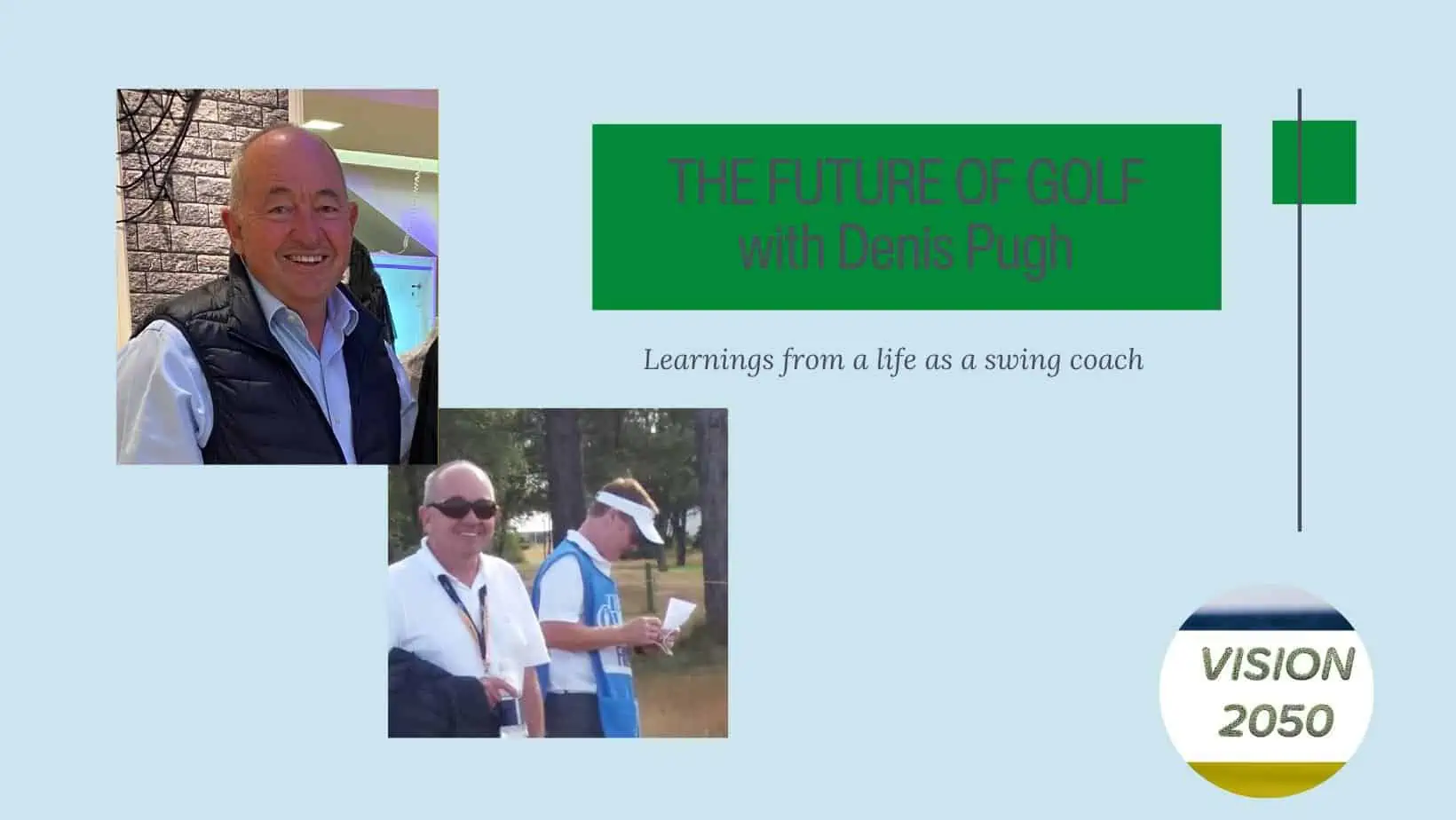Looking to the future with an eye on the past
Denis Pugh is one of the best-known swing coaches in the world. He has coached players such as Francesco Molinari, Colin Montgomerie and Ross Fisher over the years and led them to countless successes. Pugh himself, who teaches at The Wisley Golf Club in London, is a passionate golfer who has not only got to know countless courses around the world over the course of 50 years, but has also closely followed the development of golf, for example as a commentator for Sky Sport. In our Vision 2050 series, we spoke to him about the changes golf needs to make in order to be prepared for the challenges of the future.
How and at what age did you take up golf?
Denis Pugh:I remember watching the Walker Cup in 1967 when I was about 13 years old. I was watching it on TV, because I was ill, I had the flu, and I didn’t go to school. At that time I played all sorts of sports. And then suddenly, I saw golf and thought, I must give that a try. My next-door neighbor was a golfer. So he gave me a seven iron and a three iron, just to practice with a few balls, and I went to the local football pitches and hit some shots and was immediately addicted to the game.
What fascinated you most?
Denis Pugh: The main fascination was that it wasn’t a team sport. So I could just play, practice and get the feeling for the sport, the competition was down to me. I didn’t have to be picked by anyone. I played football to a very good standard, and I enjoyed playing football, but in the end, I could see that I enjoyed golf much more when I was 15. I had to choose between playing in a football match and playing in a golf event. I chose to golf, and it has been that way ever since.
Has the fascination changed over the last 30 years?
Denis Pugh: I think the challenge has never changed. Because, whilst you are with others, and you are having any conversation and the social aspect, you’re still trying to compete, and switch on and switch off. It’s one person against the golf course. In my opinion, it’s the ultimate sporting test.
Looking back at the courses you played 30 years ago, the greenkeeping and the management, what can we learn for the future?
Denis Pugh: I think that the one thing about golf that has changed, not for the better, is the high degree of sophistication in greenkeeping. Green speeds could get quicker and quicker and quicker. That’s expensive to do with all the materials that are required. And it also needs men to mow. As the greens get quicker and quicker, you need bigger areas, to design slopes on them. An average for a tour green would have been six on a stimpmeter and now with 12 it has doubled. That’s only in about 50 years, that’s the time I’ve been playing golf. For me it is negative because it needs more money to maintain. And the other important factor of course, is that the players have become very athletic, mainly due to better coaching and better gym work. That means they hit the ball very far. And as a result, more land is needed to test them, and some of the old classic courses just don’t have the land. So they become obsolete. The new courses that are being built are far too big and use up too much land. We have to tend them to meet the high demands because it’s so pure when you watch it on TV. All that puts terrible pressure on everyone and sends costs up. There are two fears for the future of golf: First, it’s just becoming too expensive to provide golf courses, so people build housing estates on them instead. And the second fear is that the game becomes like basketball, where only certain physiques can compete. I wouldn’t be a game for everyone at the highest level.
We also saw athletes like Jack Nicklaus or Arnold Palmer in the past. Do you have the feeling the gap between the normal amateur, who plays golf for fun, and the professionals has widened?
Denis Pugh: Yes, the gap has widened. A club golfer can’t actually comprehend what’s happening on tour where it’s normal now to carry the ball 300 yards. It’s normal for a professional to be able to hit a seven-iron around about 180 meters, which is crazy. It’s not normal in my world. When I played on tour, I was a short hitter, but I could hit it to 230 off the tee and Greg Norman as the best driver at the ball hit it to 260 or 270. The gap between perhaps the shortest hitter on tour, and the longest was only 30 or 40 yards. And now, if I went and played in a tournament age, if I could wind the clock back and still have my 230-yard drive, I would get to 260 just because of the improvement of equipment. But the problem is, the longest hitters on tour would be hitting it 360. And the gap suddenly goes to 100 yards. It is not fair anymore, because the shorter hitter doesn’t get the same advantage from equipment, which is mainly tuning in at high swing speed. Golf has become a high-speed sport like Formula 1.
Do the players discuss this development?
Denis Pugh: They don’t really discuss it, because it’s not to their advantage to discuss it. They are the ones that have been highly trained to perform in this environment. They would see it probably negative, too comfortable distance down. The ones who think of a better development of the game are the former players who have now had their careers, so they can see the stupidity of where the game’s going. And there are golfing officials who probably see the stupidity, but they are fearful of the kickback from the equipment companies and lawsuits and that sort of thing. Their hands are a little bit tied behind their back. I think there’s a willingness to look into the problem, but it’s more of a show than an actuality that will really change something. It’s a shame.
During the US Open the USGA tries to present classical courses. Do we still have classical courses, which will stand the test of time?
Denis Pugh: The point about the US Open is, that the USGA has to trick the courses up to a point where it’s unreasonable. That is because the USGA feels a US Open should be won by par or just a few strokes under par. The best course in the world and still the best around example of what golf could be and should be is the Old Course in St. Andrews at The Open Championship, even if the R&A has been slightly guilty of finding tees that are not even on the original course. But the R&A doesn’t mind if 20 under par wins, if it’s good weather. They don’t mind if for or five over wins, if it’s bad weather. And the point of The Open Championship is that the environment and the weather are as equal part of the challenge as design and trickery. Ridiculously fast greens are impossible in St Andrews because of the high winds. So I’d be voting for St. Andrews as the place that everyone should be looking to. This challenge is about 500 years old.
The USGA and the R&A argue that golf clubs worldwide might not be able to bear the rising costs of resources such as water, sand or personnel in the future. Do we need new rules?
Denis Pugh: Yes, we do. We have to improve the ball to make it travel a shorter distance. First we should change the clubs by making them less full size, so you don’t have such a big sweet spot. I would allow the green speed only never to be faster than six on the same green. That would affect every player. And my final thing would be the maximum length for a golf course would be 6600 yards. That works if you do all the changes together. If the pros are playing with a golf ball that went as far as a hit in the 90s, it would be fair. Let’s have a look at other sports: The 100-meter competition, which was won by Jesse Owens at the Olympics in Berlin is still the same now. It wasn’t changed to 150 meters because the men or women run faster now. This way we can actually compare the great talents over the years.
How fast could golf introduce changes?
Denis Pugh: It’s possible right now. We could limit tournament golf to 6600 yards, change the clubs and balls and limit green speed within six months. If we don’t make changes, golf becomes slow and boring. The high green speed makes the pace of play slow because players are three- and four-putting. Architects have to make courses more testing to keep up with the demands of the consumer. But compare it with football – pitches won’t be bigger just because the players run faster. So all in all, I think these things can be done tomorrow. But it won’t happen because everyone’s fearful of the consequences.
You have one wish free to make golf better for the future? What’s your wish?
Denis Pugh: Oh, let’s get the golf course playing in a way that everyone can relate to what’s happening on TV because then it’s much more entertaining. It would be nice to have some sort of relationship between the reality of hobby golfers and the reality of superstar golfers. So that’s my wish. And my ultimate wish is to have complete control of the sport. I would change it tomorrow. Then golf would also have less impact on the environment and be more acceptable with the use of the land for those who don’t even play golf themselves.









